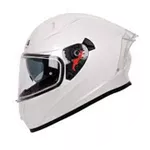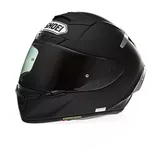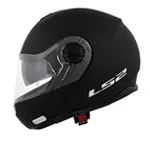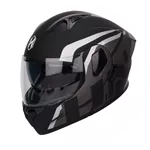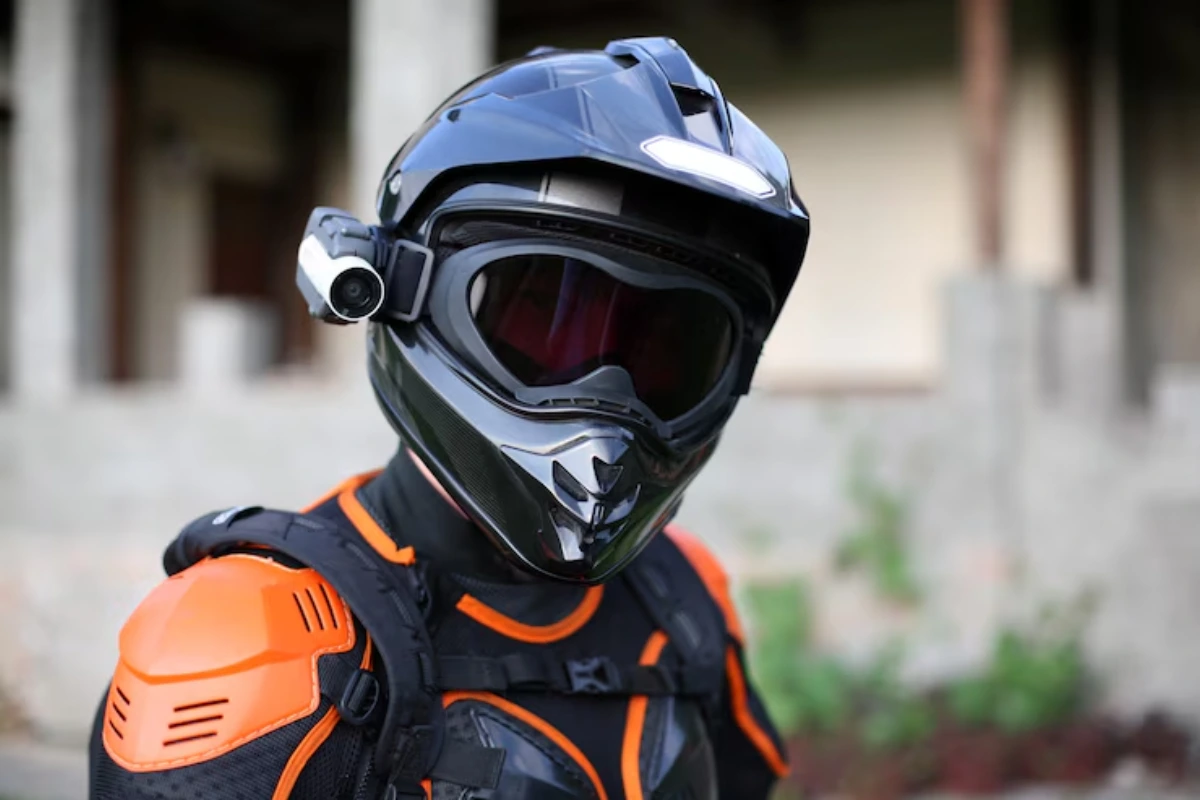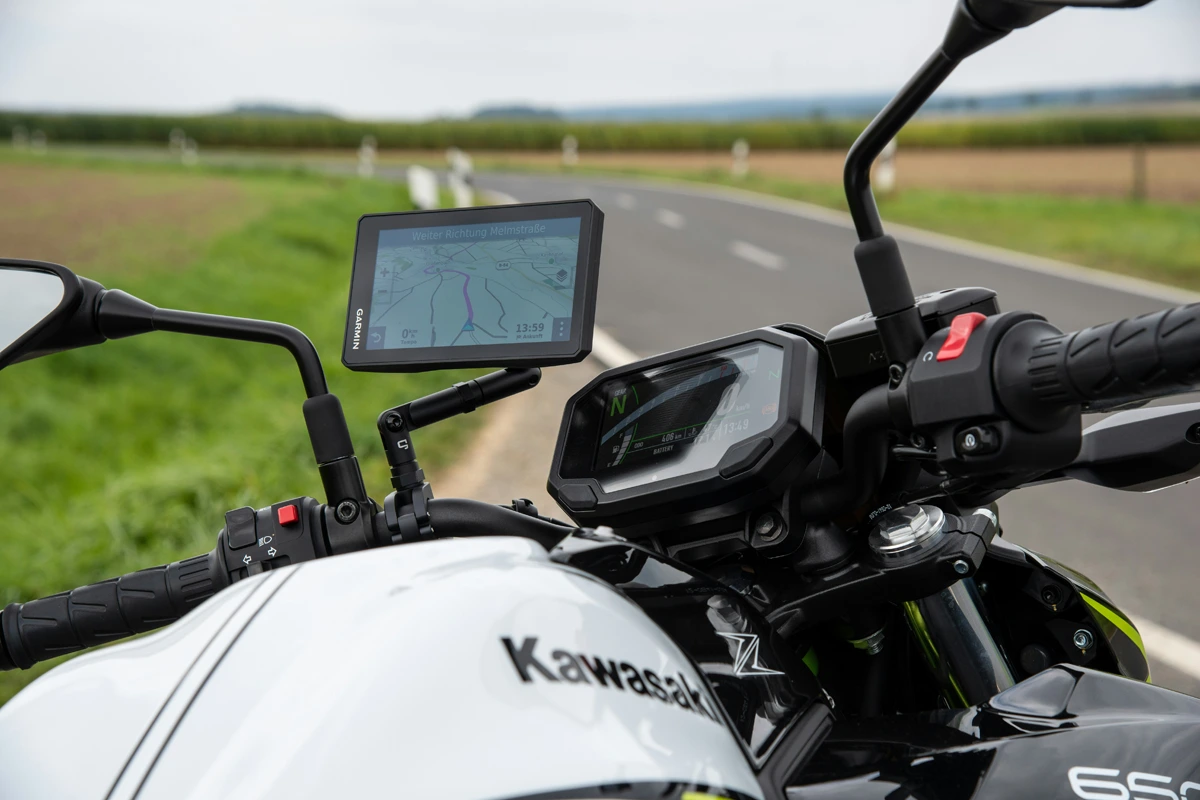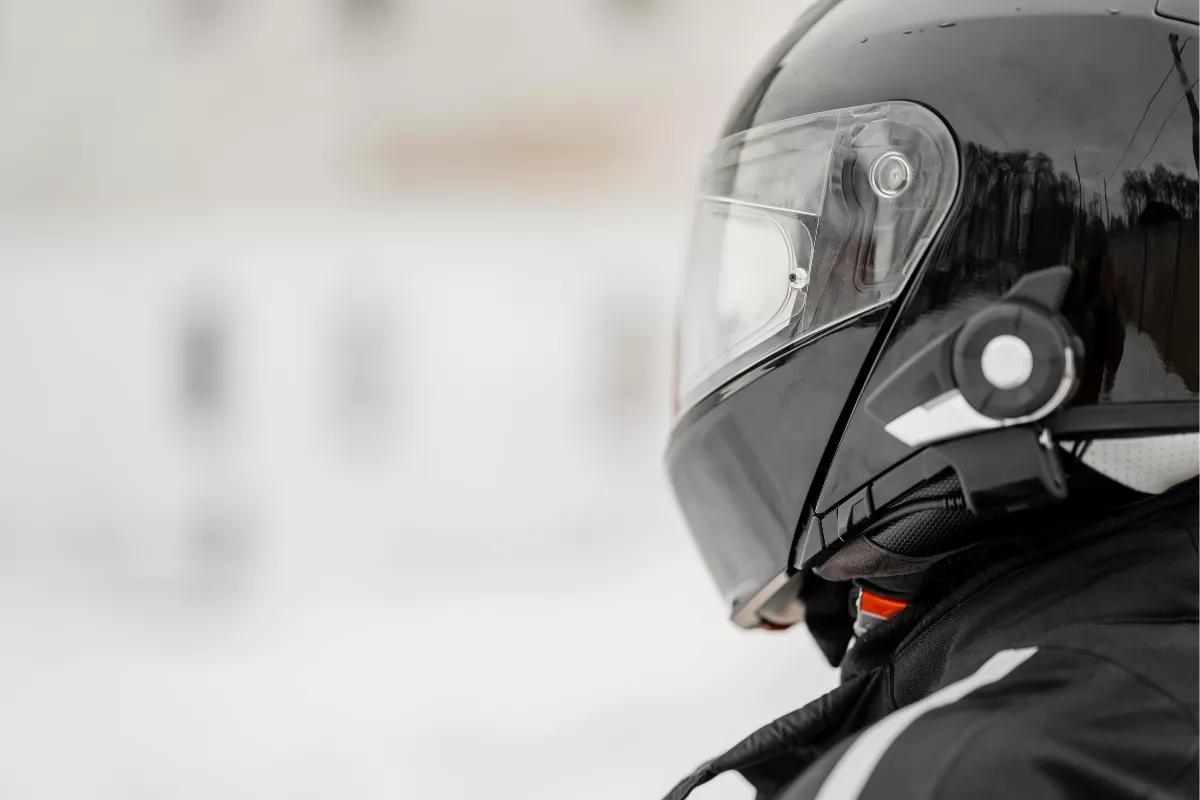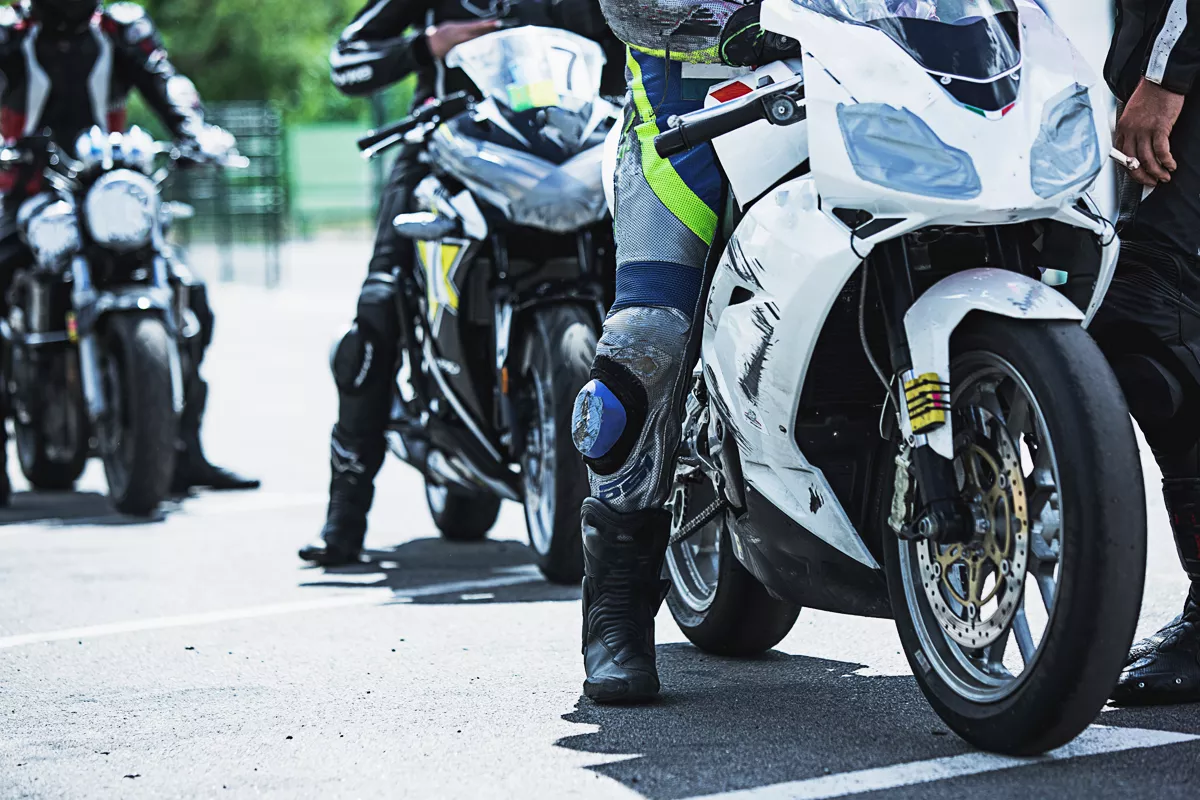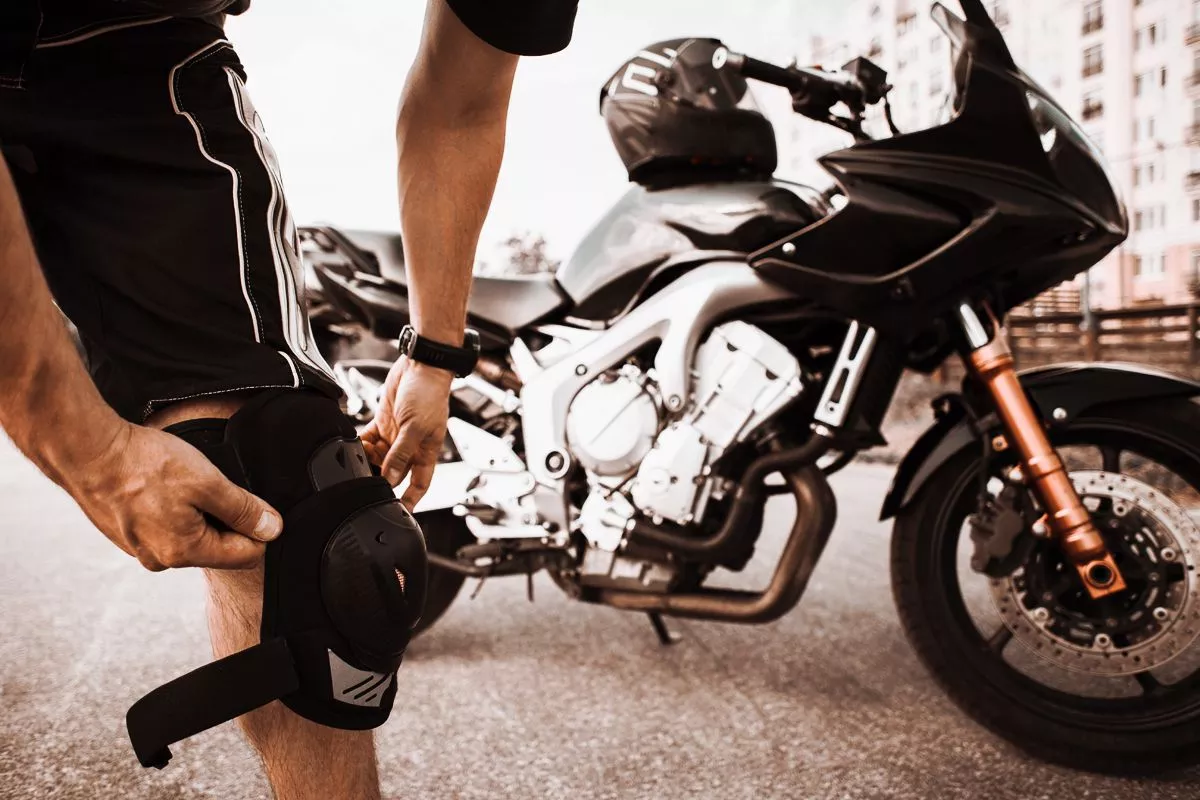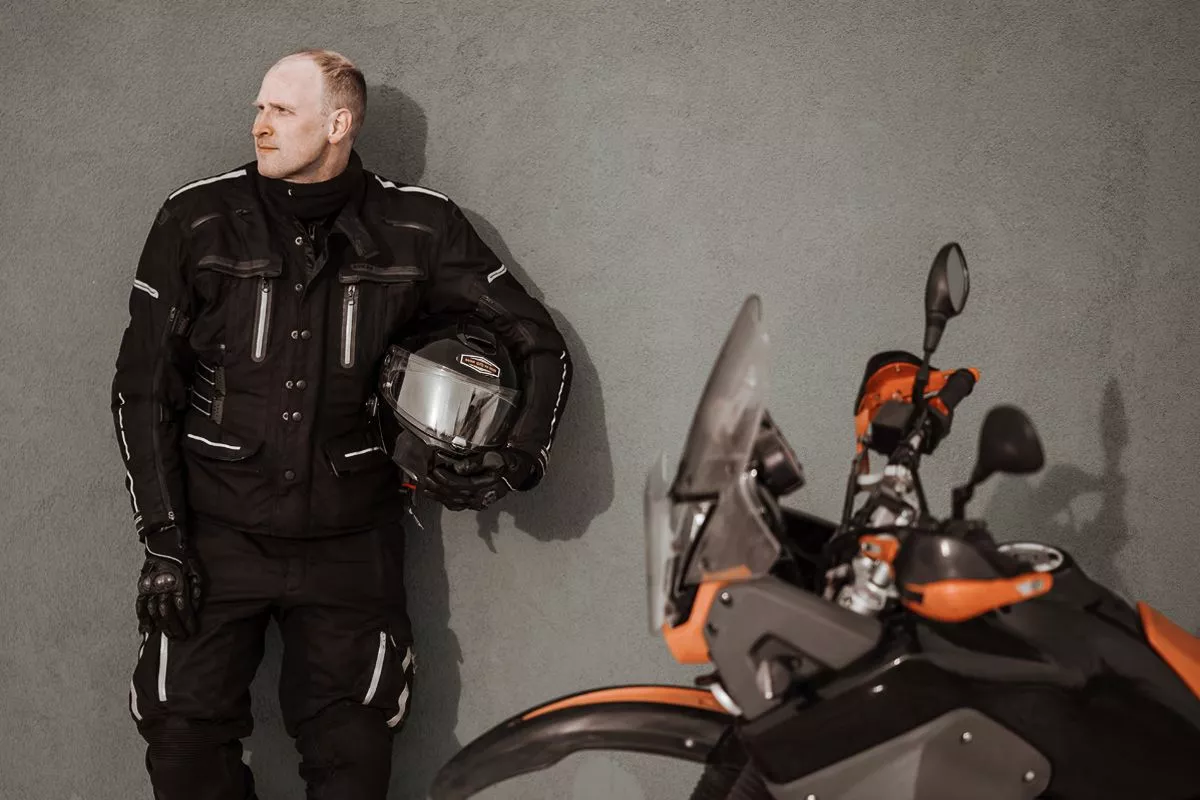In the Philippines, motorcycle helmets mean more than just safety gear. They represent a promise to stay safe and enjoy exciting journeys on the road. This article explores why helmets matter, the different kinds available, and the rules you need to know in this tropical country. Learn why these helmets matter as you get ready for safe and exciting adventures in the beautiful islands.
Embrace the thrill of riding while ensuring your safety with the finest Motorcycle Helmets in the Philippines. In this guide, we’ll delve into the diverse world of helmets, offering valuable insights and recommendations for riders of all levels.
Table of Contents
ToggleWhy is Wearing a Motorcycle Helmet Important
Head Protection
A helmet provides a protective barrier for the head, safeguarding it from injuries in case of accidents or collisions. The skull is vulnerable, and a helmet acts as a crucial line of defense against severe head trauma.
Prevention of Brain Injuries
Helmets are designed to absorb impact energy during a crash, reducing the force transferred to the brain. This significantly lowers the risk of traumatic brain injuries, which can have long-lasting and life-altering consequences.
Legal Requirement
In many places, wearing a motorcycle helmet is a legal requirement. Failure to comply with helmet laws can result in fines and penalties. Following these regulations not only ensures personal safety but also helps avoid legal consequences.
Reduced Risk of Fatalities
Studies consistently show that wearing a helmet significantly decreases the likelihood of fatal injuries in motorcycle accidents. Helmets provide a crucial layer of protection that can make a difference between life and death in the event of a crash.
Protection from Debris and Elements
Helmets also shield the rider’s face and eyes from wind, dust, insects, and other debris. This not only enhances comfort during rides but also reduces the risk of distractions that can lead to accidents.
Increased Visibility
Some helmets come with reflective elements or bright colors, enhancing the rider’s visibility on the road. This is especially important in low-light conditions or situations where other drivers may have difficulty spotting motorcyclists.
Prevention of Facial Injuries
Helmets with face shields or visors provide additional protection against facial injuries, such as abrasions or lacerations. This can be crucial in preventing disfiguring injuries and minimizing the risk of infections.
Promotion of Responsible Riding
Wearing a helmet promotes a culture of responsible riding. It sets an example for other riders and emphasizes the importance of prioritizing safety on the road.
Review of the Best Motorcycle Helmets in the Philippines
1. AGV Motorcycle Full Face Helmet K1 MIR 2018 Graphics
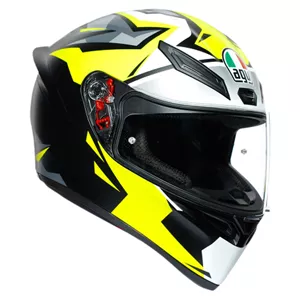
The AGV K1 MIR 2018 represents a full-face motorcycle helmet crafted specifically for sport riding enthusiasts. With its aerodynamic design and stability features, it caters to those seeking optimal performance.
Pro:
- Streamlined aerodynamic shape for improved overall performance
- Racing-inspired front air vents are designed to enhance ventilation during rides
- Wind-tunnel engineered aero spoiler to ensure stability at higher speeds
- Available in various graphic designs and colors
Cons:
- Come to a higher price point compared to other brands
2. Bell Helmet Glossy Black Full Face
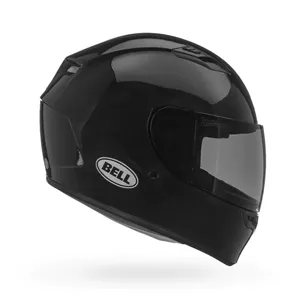
The Bell Helmet Glossy Black Full Face stands out as a contemporary and aerodynamic motorcycle helmet crafted to ensure riders’ safety and comfort. Boasting a sleek design with a glossy black finish, it combines style and functionality.
Pros:
- Lightweight design contributing to rider comfort
- Optimal airflow for excellent ventilation during rides
- Superior ventilation system enhancing overall air circulation
- Spacious eye port facilitating easy fitting of goggles
- Modern and stylish aesthetic for a fashionable appearance
Cons:
- Generates notable noise levels for a full-face helmet
- Prone to scuffing due to the flat paint finish
- The narrow head opening may lead to discomfort for some riders
- Lacks eye protection, and the sizable visor can be cumbersome
3. EVO GT PRO Matte Black Motorcycle Helmet
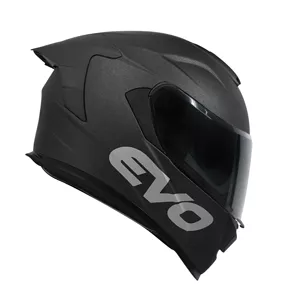
The EVO GT PRO Matte Black Motorcycle Helmet is a full-face helmet designed for riders who prioritize safety and style. It features a dual visor system and a lightweight construction for enhanced comfort.
Key Features:
- DOT and ICC certification for safety and quality assurance
- Effective ventilation system for breathability
- Stylish matte black finish
4. Gille Helmet 135 GTS V1 PLAIN Motorcycle Helmet
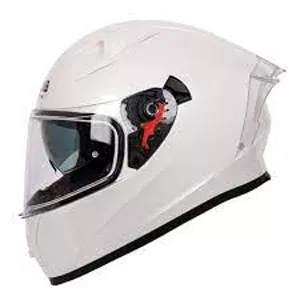
Shopee’s Choice
The Gille Helmet 135 GTS V1 stands out as a full-face motorcycle helmet featuring a dual visor and a complimentary iridium lens. Its commendable construction and comfort attributes position it as a noteworthy selection in the motorcycle helmet market.
Pros:
- Full-face design for enhanced protection
- Efficient ventilation system for optimal airflow
- Crafted for a snug and secure fit
Cons:
- Limited design options available
5. HNJ 937 Motorcycle Helmets
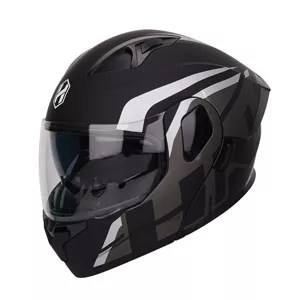
Most Affordable
The HNJ 937 motorcycle helmet is available in different variants, including open-face modular and half-face designs. It has a sleek and lightweight design that reduces wind noise and the multi-density EPS safety buffer layer provides cutting-edge energy absorption capabilities.
Key Features:
- Versatile design options to suit different rider preferences
- Dual visor variants offer enhanced visibility and protection.
- Durable ABS shell with high strength, lightweight, and excellent impact resistance
- Soft and comfortable padding liner for added comfort
6. LS2 Motorcycle Modular Helmet FF325 Strobe
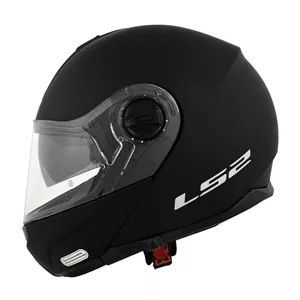
Best Modular Helmet
The LS2 FF325 Strobe stands out as a versatile modular motorcycle helmet, featuring a durable polycarbonate shell. Its clear Lexan injected visor is equipped with anti-scratch treatment and UV protection. This helmet holds certifications from DOT/ECE and boasts a 3-star SHARP safety rating.
Pros:
- Enhances versatility with a modular structure
- Improves visibility with a dual visor system
- Quick-Release Chinstrap
Cons:
- Some users report wind noise at high speeds
- Limited color options available
7. MT STREET Solid Open-Face Single Visor Helmet
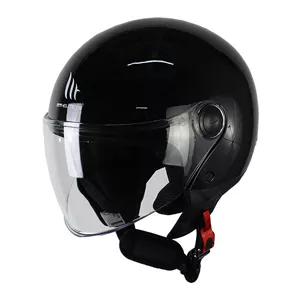
Best Open-Face Helmet
The MT STREET Solid Open-Face Single Visor Helmet stands out as a lightweight and cozy headgear specially crafted for urban rides. With its open-face design, it offers an expansive field of vision, while the single visor enhances the protective features.
Pros:
- Lightweight and Comfortable
- Outer Visor Protection
- The open-face style provides an unobstructed view, enhancing overall visibility.
- Enhanced Head Protection
Cons:
- The open-face design may offer less coverage compared to other helmet types
- Riders experience increased wind exposure due to the helmet’s design
8. NHK Helmet GPR TECH V2 Solid Black
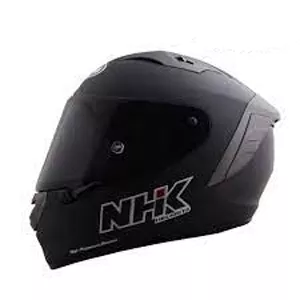
The NHK Helmet GPR TECH V2 Solid Black is a standout high-performance helmet that seamlessly blends safety with style. The solid black design elevates its overall look, adding a touch of sleekness.
Pros:
- Ideal for High-Speed Racing
- Equipped with aerodynamic vents and a safety lock on the visor to enhance overall safety
- Intercom-Ready Design
- Crafted with high-quality materials, ensuring durability and long-lasting performance
- Features designed to minimize wind noise, providing a quieter and more enjoyable ride
Cons:
- Heavier Build which can be a consideration for prolonged use
- Comes at a higher price point compared to other brands
9. Sec Windstorm V3 Modular Dual Visor Helmet
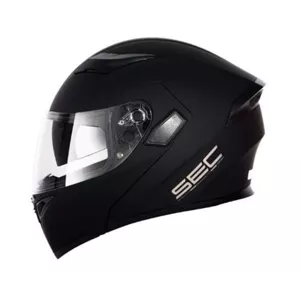
The Sec Windstorm V3 Modular Dual Visor Helmet stands out as a flexible headgear crafted for safety and ease. Its practicality is enhanced by the combination of a modular design and a dual visor system.
Pros:
- Equipped with two visors, providing enhanced visibility and adaptability to various conditions
- Engineered for optimal aerodynamics, reducing wind resistance during rides
- Designed for a comfortable fit, ensuring an enjoyable wearing experience
- Visors are crafted to withstand scratches, ensuring clear visibility over an extended period
Cons:
- Heavier Build which can be a consideration for prolonged use
10. SHOEI Full Face Motorcycle Helmet SHOEI X14
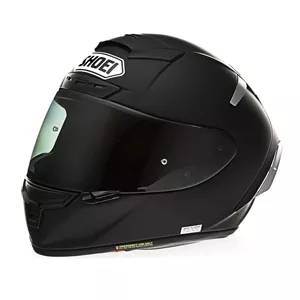
Best Full-Face Helmet
The SHOEI X14 Full Face Motorcycle Helmet is a top-notch choice for motorcycle enthusiasts, blending advanced features with a stylish and practical design.
Pros:
- Prioritizes head protection with a strong emphasis on safety, meeting high standards
- Engineered for optimal aerodynamics, reducing wind resistance during rides
- Comfortable Fit
- Effective Ventilation
- High-quality visor guarantees clear sight, elevating overall safety
Cons:
- Heavier Build which can be a consideration for prolonged use
- Comes at a higher price point compared to other brands
11. SMK Motorcycle Modular Helmet Gullwing Mono
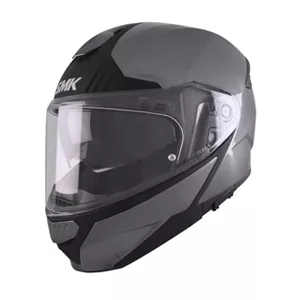
The SMK Gullwing Mono is a flip-up modular helmet crafted for both tourers and everyday two-wheeler enthusiasts. Its modular design brings versatility to cater to diverse riding conditions.
Pros:
- The dual visor ensures improved visibility for a safer riding experience
- The quick-release chinstrap adds a touch of convenience for easy use
- Stylish Design
- Experience better visibility in changing light conditions with the tinted shade
Cons:
- In open-face mode, some riders find the noise levels slightly higher than expected
12. SPYDER PHOENIX2 P PLAIN FULL FACE SINGLE VISOR MOTORCYCLE HELMET
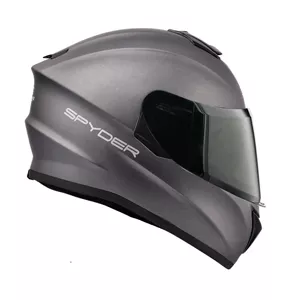
The SPYDER PHOENIX2 P is a full-face motorcycle helmet featuring a single visor, carefully crafted for simplicity and practicality.
Pros:
- Competitive Pricing
- The ABS composite shell ensures lightweight yet effective protection
- Benefit from dual-density EPS for an added layer of safety during your rides
Cons:
- The plain design may lack the flashy aesthetics some riders prefer
13. ZEBRA FF805 Plain Motorcycle Helmets
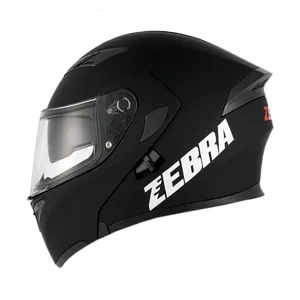
The ZEBRA FF805 is a full-face motorcycle helmet with a dual visor that combines affordability, lightweight protection, and enhanced safety features for riders who value a straightforward design.
Pros:
- ICC/DOT/ECE certified for safety
- High-strength ABS shell for impact resistance
- Lightweight design reduces wind noise
- Adjustable ventilation system for comfort
Cons:
- The ventilation system may vary in certain conditions
How to Choose the Perfect Motorcycle Helmet
Safety Standards
Ensure the helmet meets safety standards such as DOT (Department of Transportation) or ECE (Economic Commission for Europe) certification. These standards ensure the helmet has passed rigorous safety tests.
Helmet Type
Choose the type of helmet based on your riding style. Full-face helmets provide maximum protection, open-face helmets offer a balance of protection and visibility, and half helmets provide minimal coverage but a sense of freedom. Select the type that suits your preferences and riding needs.
Fit and Comfort
A proper fit is crucial for both safety and comfort. The helmet should snugly fit around your head without being too tight or too loose. Check for pressure points and ensure the helmet sits level on your head. The cheek pads and helmet liner should also be comfortable.
Retention System
The retention system, typically a chin strap, should securely fasten the helmet. Make sure it’s adjustable and easy to use. A double D-ring or quick-release buckle is common in quality helmets.
Ventilation
Adequate ventilation is essential for comfort, especially on hot days. Look for helmets with well-placed vents that can be opened or closed to regulate airflow. Ventilation helps prevent overheating during rides.
Weight
Lightweight helmets are generally more comfortable for extended periods of use. Consider the materials used in the helmet’s construction, such as fiberglass or carbon fiber, to ensure a balance between weight and durability.
Visor and Shield
Check the visibility features of the helmet. Full-face helmets should have a clear, anti-fog visor. Some helmets come with additional features like UV protection, photochromic visors, or pin-lock systems to prevent fogging.
Quietness
Noise levels can vary between helmets. If you prefer a quieter ride, look for helmets designed to minimize wind noise. Some helmets come with noise-reducing features, like aerodynamic designs or additional padding.
Style and Design
Choose a helmet that reflects your style preferences. Many helmets come in a variety of colors and designs. While aesthetics are a personal choice, prioritize safety features over style.
Budget
Set a budget and explore helmets within that range. There are quality helmets available at various price points. Balance your budget with the safety features and comfort elements that matter most to you.
What are the Types of Motorcycle Helmets
Full-Face Helmets
Full-face helmets provide complete coverage, enclosing the entire head and featuring a chin bar. They offer the highest level of protection, shielding the face, head, and jaw. Full-face helmets are popular for their comprehensive safety features.
Open-Face Helmets (3/4 Helmets)
Open-face helmets cover the top, sides, and back of the head but leave the face open. They provide good visibility and airflow but offer less protection to the face compared to full-face helmets. They often come with a shield or goggles for eye protection.
Half Helmets (Brain Buckets)
Half helmets cover only the top of the head, leaving the face and sides exposed. While they offer minimal coverage, they are lightweight and provide a sense of freedom. However, they offer less protection compared to full-face or open-face helmets.
Modular Helmets (Flip-Up Helmets)
Modular helmets combine features of full-face and open-face helmets. They have a hinged or modular design, allowing the rider to flip up the front section, converting it into an open-face helmet. This provides versatility, allowing riders to enjoy both full-face protection and the convenience of an open-face style.
Off-Road (Motocross) Helmets
Off-road helmets are designed for dirt biking and motocross. They feature a distinctive shape with a sun peak (visor) to shield the eyes from sun and dirt. Off-road helmets prioritize ventilation and a lightweight design, catering to the demands of off-road riding.
Dual Sport Helmets
Dual sport helmets are versatile and suitable for both on-road and off-road riding. They combine features of street helmets and off-road helmets, providing a balance between protection and functionality. They often come with a face shield and sun peak.
Adventure Touring Helmets
Adventure touring helmets are designed for long-distance touring and adventure riding. They usually have a visor, a face shield, and good ventilation. These helmets prioritize comfort during extended rides.
Trials Helmets
Trials helmets are specialized for trial rides, featuring a unique design with minimalistic coverage. They prioritize lightweight construction and enhanced visibility, allowing riders to maneuver with precision.
How to Clean and Maintain Your Motorcycle Helmets
1. Regular Inspection
Before cleaning, inspect your helmet for any damage, cracks, or wear. Ensure that all components, such as the visor, chin strap, and vents, are in good condition.
2. Cleaning the Exterior
- Use a mild soap or baby shampoo mixed with water to clean the outer shell. Avoid harsh chemicals that may damage the helmet’s finish.
- Gently scrub the surface with a soft sponge or cloth to remove dirt, bugs, and grime.
- Pay attention to areas with vents and crevices, ensuring they are thoroughly cleaned.
3. Cleaning the Visor
- Remove the visor and clean it separately. Use a microfiber cloth or a sponge with a mild soap solution to wipe away dirt.
- If the visor has stubborn debris, soak it for a few minutes before gently wiping it clean.
- Avoid using abrasive materials that could scratch the visor.
4. Interior Cleaning
- Remove the inner liner and cheek pads if they are removable (check the helmet’s manual for guidance).
- Hand wash the liners in mild detergent or follow the care instructions provided by the manufacturer.
- Allow the liners to air dry completely before reassembling them into the helmet.
5. Cleaning the Chin Strap
- Wipe the chin strap with a damp cloth to remove sweat and grime.
- If the chin strap is removable, follow the manufacturer’s instructions for cleaning.
6. Disinfecting
- To eliminate bacteria and odors, use a helmet disinfectant spray or a mixture of water and mild disinfectant.
- Spray the solution on the interior, allowing it to air dry completely.
7. Helmet Storage
- Store your helmet in a cool, dry place away from direct sunlight.
- Avoid hanging the helmet by the chin strap, as this can deform its shape.
- Use a helmet bag or cover to protect it from dust when not in use.
8. Visor Care
- Apply an anti-fog treatment to the inside of the visor if it doesn’t already have an anti-fog coating.
- Replace the visor if it becomes heavily scratched, as it can affect visibility.
9. Avoid Harsh Chemicals
Refrain from using gasoline, solvents, or abrasive cleaners, as they can damage the helmet’s materials.
10. Helmet Replacement
Helmets have a limited lifespan. Replace your helmet if it has been involved in a crash, shows signs of damage, or has reached its expiration date as specified by the manufacturer.
What are the Motorcycle Helmet Safety Standards in the Philippines
Philippine Standard (PS) Quality Certification Mark
Helmets must bear the PS Quality Certification Mark to indicate compliance with the standards set by the Bureau of Product Standards (BPS).
Certification from the Department of Trade and Industry (DTI)
Helmets must be certified by the DTI before they can be sold or distributed in the Philippines.
Quality Standards
Helmets must conform to the specifications and standards set by the BPS, ensuring that they provide adequate protection to the head and neck.
Prohibition of Substandard Helmets
The law prohibits the sale and use of substandard helmets that do not meet the safety requirements.
Penalties for Non-Compliance
Violations of the Motorcycle Helmet Act, such as the use of substandard helmets, may result in fines and penalties.
Personal Insights and Recommendations
Prioritizing safety is crucial when it comes to choosing a motorcycle helmet. Reflecting on my rides through the bustling streets of Manila, I’ve come to realize the significance of a reliable helmet. Ensuring a snug fit and robust construction should be non-negotiable for every rider. Remember, it’s not just a gear but a shield for your well-being. Take time to find the helmet that fits seamlessly into your lifestyle, providing the protection you need without compromising comfort. Your head deserves the best, so choose wisely.
Motorcycle Helmets Frequently Ask Questions (FAQs)
Are helmet accessories necessary?
Enhance your riding experience with accessories like visors and Bluetooth communication systems. While not mandatory, these additions can elevate both safety and enjoyment.
How often should I replace my helmet?
Regularly inspect your helmet for signs of wear and tear. Replace it every five years, or sooner if it has endured a significant impact, to guarantee optimal protection.
Can I personalize my helmet?
Express your individuality by customizing your helmet’s appearance. However, prioritize safety over aesthetics and ensure modifications adhere to safety standards.
Are full-face helmets suitable for Philippine weather?
Despite misconceptions, full-face helmets offer excellent ventilation. Look for models with effective ventilation systems to stay cool during rides in the Philippines’ tropical climate.
What’s the importance of proper helmet fit?
A well-fitted helmet is crucial for optimal protection. Follow sizing guides provided by manufacturers and ensure a snug fit to enhance safety and comfort.
How do I clean my helmet without damaging it?
Gently clean your helmet with mild soap and water. Avoid harsh chemicals that may compromise the helmet’s integrity, ensuring its longevity and effectiveness.
Are modular helmets as safe as full-face helmets?
Modular helmets are considered safe when the chin bar is down. However, full-face helmets generally provide more consistent protection.
Can I wear eyeglasses with a full-face helmet?
Many full-face helmets are designed to accommodate eyeglasses. Check for features like prescription-friendly padding or removable cheek pads for easier use with glasses.
Can I use a second-hand helmet?
It’s not recommended to use second-hand helmets, as their history and potential damage may be unknown.
Do more expensive helmets offer better safety?
Higher-priced helmets may have additional features, but safety is not solely determined by cost. Look for proper certifications.
Conclusion
In conclusion, Motorcycle Helmets in the Philippines play a pivotal role in ensuring every ride is both safe and stylish. Invest in a quality helmet, follow safety guidelines, and embark on journeys filled with excitement, confidence, and utmost protection.
By Ninelives Editorial Team | Updated February 3, 2024
Written By

The Ninelives Team is a bunch of passionate folks crazy about bikes and motorcycles. We've been around the block, literally, and know the ins and outs of the riding world. Our goal? To dish out articles that are not just fun to read but also packed with practical, tried-and-true advice. From road trips to gear guides, we've got your back. We're not just enthusiasts; we're your go-to pals for reliable, down-to-earth insights into the awesome universe of cycling and motorcycling. Stick around, and let's ride through it together!
You may also like
11 Best Motorcycle Cameras in the Philippines
Explore the top motorcycle cameras available in the Philippines—designed for…
11 Best Motorcycle Navigation Monitors in the Philippines
Navigating the roads in the Philippines can be a real challenge, especially for…
11 Best Motorcycle Bluetooth Intercom Systems in the Philippines
Communication is crucial when riding a motorcycle, whether you’re in a…
11 Best Motorcycle Boots in the Philippines
Motorcycle boots are an essential piece of gear for riders in the Philippines,…
13 Best Motorcycle Knee Pads in the Philippines
Motorcycle riding is a popular mode of transportation in the Philippines. But…
13 Best Raincoats for Motorcycle Riders in the Philippines
Motorcycle riders in the Philippines often encounter unpredictable weather…


